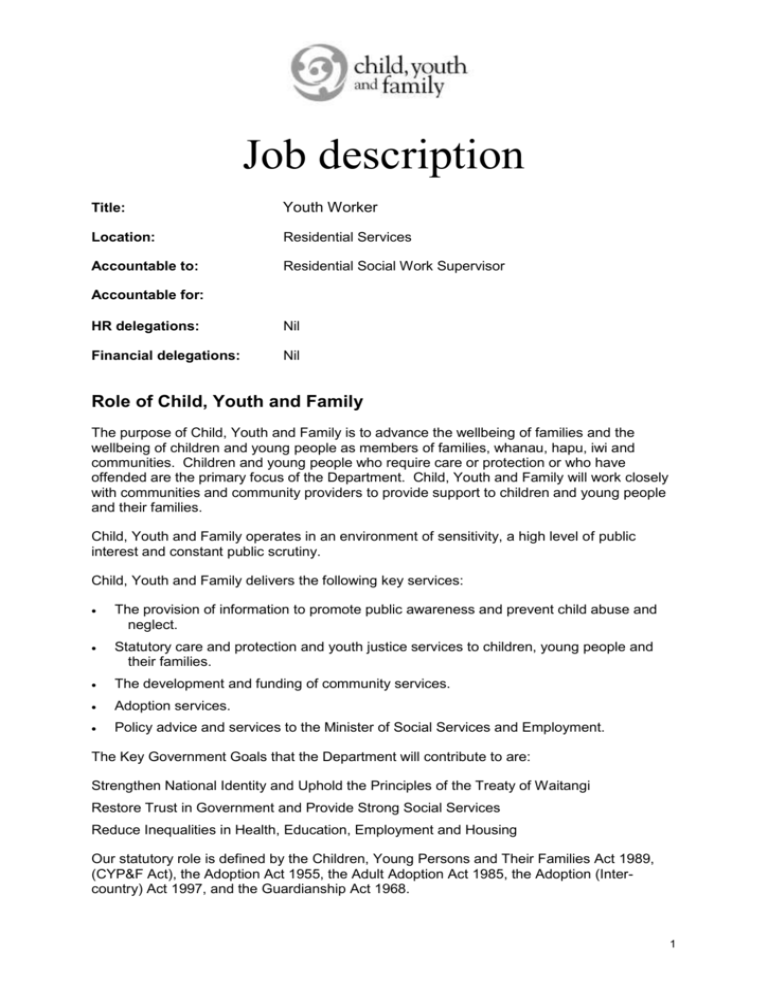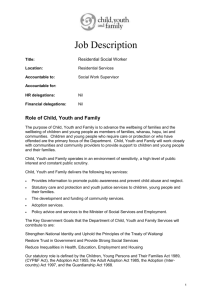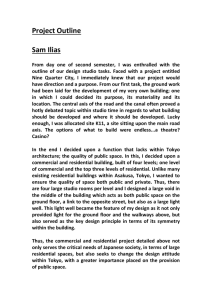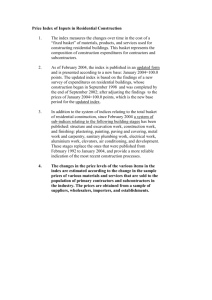Job description - Child, Youth and Family
advertisement

Job description Title: Youth Worker Location: Residential Services Accountable to: Residential Social Work Supervisor Accountable for: HR delegations: Nil Financial delegations: Nil Role of Child, Youth and Family The purpose of Child, Youth and Family is to advance the wellbeing of families and the wellbeing of children and young people as members of families, whanau, hapu, iwi and communities. Children and young people who require care or protection or who have offended are the primary focus of the Department. Child, Youth and Family will work closely with communities and community providers to provide support to children and young people and their families. Child, Youth and Family operates in an environment of sensitivity, a high level of public interest and constant public scrutiny. Child, Youth and Family delivers the following key services: The provision of information to promote public awareness and prevent child abuse and neglect. Statutory care and protection and youth justice services to children, young people and their families. The development and funding of community services. Adoption services. Policy advice and services to the Minister of Social Services and Employment. The Key Government Goals that the Department will contribute to are: Strengthen National Identity and Uphold the Principles of the Treaty of Waitangi Restore Trust in Government and Provide Strong Social Services Reduce Inequalities in Health, Education, Employment and Housing Our statutory role is defined by the Children, Young Persons and Their Families Act 1989, (CYP&F Act), the Adoption Act 1955, the Adult Adoption Act 1985, the Adoption (Intercountry) Act 1997, and the Guardianship Act 1968. 1 In all of our activities we seek to realise our vision, and to model and encourage others to demonstrate our identified values. Vision The Department’s vision is: Safe children and young people in strong families and responsive communities free from abuse free from neglect free from offending Values In everything it does, the Department seeks to exemplify the values of: Integrity – Fairness – Respect Role of Residential Services Child Youth and Family operates seven residences around the country (Auckland (2), Palmerston North, Wellington, Christchurch (2) and Dunedin) providing residential placements for children in the care or custody of the Department. The Department has a mandate through the Children, Young Persons and Their Families Act 1989 (CYP&F Act) to deliver both youth justice and care and protection services to children, young people and their families. Residential services provided by Child, Youth and Family, are a serious intervention in the lives of children and young people. Care and Protection placements are offered for children and young people who are not able to be placed within the community while Youth Justice placements are offered for young people who have been remanded into the custody of the Chief Executive who are not able to be safely placed in the community or to young people who have been sentenced to Supervision with Residence through the Youth Court. It is important to remember that a residential placement is only considered when no safe community alternative is available. The Department also operates a small unit, at Youth Justice North, for up to 6 young people sentenced to terms of imprisonment. Children and young people placed in residences often present with extreme behaviours, problems and needs. The tension between the rights of the children and young persons and their families and the need for safe containment, security and planned individual work in the interests of the children and young persons and the wider community is at its sharpest in these services. Accordingly, admission to and management of Residential Services are very closely regulated through both the CYP&F Act and the Children Young Persons and Their Families (Residential Care) Regulations 1996. Residences provide a safe and secure environment, while providing both individual and group programmes for residents. Programmes focus on individual change and growth through specialist education services, programmes targeted to individual needs, clinical services, cultural programmes and physical activities. Every child or young person placed in a residence has an individual care plan which is jointly developed through field social workers, families and residential social workers. 2 Purpose of position To provide professional care and protection for children and young persons entrusted to Child, Youth and Family, ensuring that we demonstrate appropriate models of behaviour, acknowledging the personal influence on the life of each child or young person, and that this interaction has a positive influence and brightens the outcome for those children and young persons in our care. To deliver day to day care services for the children and young people in residence. To deliver planned programmes for children and young people within a residential setting, to meet individual youth justice and care plan objectives; with programmes that do not compromise any individual’s health, safety or well-being. Functional Relationships The Youth Worker will develop and maintain effective links with Lead Educators, Teaching staff, the Maori and Pacific Island Communities, professional agencies, service providers and client groups that relate to the practice area. The Youth Worker will work co-operatively and professionally with other colleagues, (incl. Night Staff) within the Department. Key Accountabilities To work with families to manage and ensure care and security for children and/or young people in the care or custody of the Department. To deliver quality services within the practice area: In accordance with the CYP&FAct and all other relevant legislation; In compliance with Government policy and Departmental requirements; In a caring and culturally appropriate manner and consistent with the Departmental Code of Practice; Within the financial parameters set; In a professional and timely manner. The Youth Worker will be accountable for: Delivering a professional residential care services focused on meeting individual needs by: Providing the day to day care of all children and young people in residence. Developing and implementing in consultation with Managers, Supervisors and caseworkers a programme of recreational and cultural activities appropriate and specifically designed to meet the needs of Children and Young People in the residence at the time. Assisting in the planning of intervention processes for children and young people in consultation with residential staff, colleagues, family and/or whanau. Developing and implementing evening and weekend programmes for the Child or Young Person in consultation with them, the residential staff, colleagues, family and/or whanau. 3 In consultation with Managers, Supervisors and Residential Social Workers ensuring that interventions and programmes for children and young people are planned, implemented and reviewed in accordance with relevant legislation, regulation, policies and codes of ethics/practice. In consultation with Managers, Supervisors and Residential Social Workers ensuring ongoing contact with family/whanau, and other appropriate people. In consultation with Managers and Supervisors providing appropriate information to clients (individuals and families), professionals (within and outside the Service) and other people working with these clients, to facilitate appropriate decision-making and to maximise successful outcomes for children and young people. In consultation with Managers and Supervisors and in conjunction with the education provider, ensuring that integrated programmes appropriate to the abilities and identified needs of children and young people in residence are offered. Consistently maintains the rights and dignity of the individual child or young person. Delivering a professional residential care service by: Performing the duties of Youth Worker in a professional manner, in accordance with relevant legislation, regulation, policies and codes of ethics/practice. Modelling the CYF values of Integrity, Fairness and Respect. Being personally proactive, identifying, managing and mitigating risks. Ensuring that formal and professional records are developed and maintained in a consistent and timely manner. This includes the use of computer information systems. Planning for personal training, coaching and development opportunities are discussed with Supervisor. Assisting Children and Young People to develop an appreciation of their own and others culture. Developing and maintaining appropriate community, cultural and professional networks. Carrying out all reasonable and lawful instructions given by Managers, Supervisors or duly authorised employees of the Department. Raising any issues of concern with your supervisor as soon as practicable in relation to feelings of personal safety and client safety. Identifying and reporting all job-related hazards. Providing effective supervision, care and custody of Children and Young People who are in the Residence by: Minimising the opportunity for absconding by ensuring that the whereabouts of the Children and Young People is closely monitored at all times within the residence, within the community or while being escorted to another location. Managing non-compliant client behaviours through the use of appropriate consequences for undesired behaviours which are consistent with Departmental policy and the Residential Regulations 1996. 4 To operate as part of a team that meets the day to day needs of the Children and Young People in Residence by: Planning, assisting with and supervising the completion of the daily management tasks of the Residence. Performing the responsibilities of shift co-ordination as directed by the Supervisor and/or Unit Manager/ Practice Manager. Communicating clearly with other team members about residents; ensuring that information is shared and recorded, where there is a likelihood or potential risk of harm to any other individual. Utilising a range of appropriate methods for managing work priorities, personal workload and stress levels within the context of the team structure. Ensuring that a safe working environment is maintained for self, colleagues and residents, by following Health and Safety policies and practising safe work methods. Contributing to and/or leading group meetings and discussions with young people. Undertaking administrative and other tasks. Youth Workers may be required to provide a 24-hour, 7-day a week service, which may include shift-work (weekends and public holidays). Appointee Specification The appointee will be required to focus on the outcomes for children and young persons entrusted to Residential care. The Chief Executive expects the appointee to work actively and consistently for the safety and benefit of the children and young persons and to ensure that the outcomes for those children and young persons are positive and can genuinely be called successful. The appointee will: Demonstrate a belief and commitment to ensuring that the paramount element of importance in his/her work is the safety of and outcomes for children and young persons. Add value to – young peoples lives. Demonstrate an understanding of the impact of each interaction with children and young persons. Display an ability to use initiative, judgement and tenacity to challenge unsafe or unacceptable practice. Demonstrate a child focussed practice approach. Respect and maintain the confidences and privacy requirements of children and young persons, in so far as these confidences do not place another at risk of harm. Develop and maintain an appreciation and caring for a child or young person’s situation and personal feelings, without compromising security or personal behaviour. 5 Key Selection Criteria Qualifications A recognised qualification in Sport & Recreation, Health, Youth Work, Teaching, or other relevant discipline, or Other tertiary qualification with emphasis on Sport & Recreation, Youth Work, Social Work, education, health, psychology or other papers providing a theoretical framework for understanding human behaviour, especially with respect to children and young people or Study towards a level 6 (old Level B) qualification in Social Work or Consideration may be given to applicants with a Level 4 (old Level ‘A’ )qualification in Social Work (e.g. Certificate of Social Work) provided other essential and desirable requirements are met. A current full driver’s licence is essential. Knowledge and Experience Highly Desirable (able to demonstrate) A successful record in or preparedness for the quality delivery of learning and recreational activity for children and young people especially in statutory social work services An appreciation and acceptance of new technology. Good computing skills, including the use of MS Office software (Word, Excel and web browsers). A sound knowledge and ability to apply the Children, Young Persons, and Their Families Act 1989, Guardianship Act 1968, Privacy Act 1992, and Official Information Act 1981. Desirable (able to demonstrate) Familiarity with, and an understanding of the Public Finance Act 1989, State Sector Act 1988, and Employment Relations Act 2000. Skills, Personal Attributes and Abilities Required The appointee will be able to: Communicate sufficiently fluently in the English language so as to be readily understood by all contacts. Be able to prepare without support an accurate, understandable and usable report or incident record. Demonstrate empathy for working with children and young persons. Demonstrate tolerance and understanding. Demonstrate an ability to work with comfort and success with professional staff from other vocations e.g. teachers, advisors, clinical staff etc. Actively promote a pro-social environment. 6 Demonstrate success in aligning personal practice with CYFS visions, goals, policies and practices. Demonstrate ethical practice and the maintenance of professional boundaries. Excel as a role model for staff, children and young persons. Show a high degree of consistency in behaviour at all times and act as a clear role model, generating confidence and commitment of others through his/her own ethical conduct. Exhibit discretion and be able to earn the trust of children, young persons and other staff. Always display common sense even in testing situations. Key Capabilities The following capabilities will be required and in addition to the Key Selection Criteria will be used in assessment for appointment: 1. Personal attributes - excellence in this area promotes the safety of self and service users Interpersonal Understanding Correctly interprets and responds to concerns, motives and feelings of others; listens sympathetically. Appreciates people’s strengths and limitations and understands the differences between individuals. Listens to and understands directly and indirectly expressed feelings. Demonstrates sympathy for the concerns of others. Encourages others to express themselves openly. Respects other people’s confidences. Flexibility Able to adapt to a variety of situations, understanding and appreciating different and opposing perspectives of a situation. Open minded and flexible in dealing with circumstances as they arise. Approaches major changes in the organisation with a positive and constructive attitude. Adapts own approach within agency procedures to the demands of the work environment to ensure full effectiveness. Welcomes variety and change in work patterns. Adapts easily to changes at work. Modifies own behaviour in response to a situation. Sees the merits of differing positions or opposing viewpoints. Emotional Awareness Aware of the range of emotions in self and others. Knows which emotions s/he is feeling and why. Recognises the links between feelings and what s/he thinks, does and says. Maintains effective work performance, remaining calm and self- controlled, when under pressure or in difficult or frustrating circumstances. Keeps emotions under control when faced with opposition or hostility from others, or when working under conditions of stress. Manages strong emotions and responds constructively to the source of problems. In highly stressful situations, keeps own feelings in check, takes constructive action and calms other people down. Has a variety of mechanisms for dealing with stress, can recognise when to use them and does so. 7 Initiative Takes responsibility for own actions and uses initiative to deal with situations before being directed. Acts in a confident, resourceful, self-directed way to identify and resolve difficulties. Does significantly more than is minimally required. Discovers and acts on opportunities. Looks ahead and anticipates what needs to be done. Takes action before being asked or required by circumstances. Seeks appropriate assistance when limits of own capabilities are reached. Confronts difficult issues or setbacks straightforwardly and honestly. 2. Commitment to the service - excellence in this area promotes high quality care for service users Service User Orientation Sees children’s safety and the welfare of service users as paramount. Demonstrates a clear personal commitment to meeting service users’ requirements and delivering a high quality service. Sensitive to the needs and concerns of service users, is willing to focus effort on assessing their needs and attending to them. Aware of the need to empower service users and to work in partnership with them Strives to meet, and where appropriate, surpass service users’ expectations. Maintains appropriate contact with service users until problems are resolved. Makes self available appropriately to service users at critical periods. Team Working Gives commitment and support to the work of the team. Takes positive steps to keep team colleagues informed and to deal with personal conflicts openly and constructively. Pools ideas and builds on the contributions of other team members. Works collaboratively, is cooperative and provides encouragement to others. Gives and receives feedback constructively and regularly. Establishes positive relationships with team members. Shares all relevant or useful information. Actively supports team decisions. Contributes fully to team workload. Developing Others Makes effective efforts to develop the skills and competencies of others. Coaches and provides specific and helpful feedback and general guidance to service users. Contributes to the development of others. Demonstrates a commitment to the principle of personal development. Encourages initiative in solving problems and making choices. Provides clear, specific and relevant feedback. Breaks difficult tasks into simpler steps to build confidence. Explores alternatives aimed at improving people’s performance. Assumes appropriate responsibility for addressing service users’ problems. 3. Organisational accountability - excellence in this area promotes the safety of self, service users and the agency Leadership Acts appropriately as the leader of a group or team and provides a clear focus and direction for the group’s activity. Motivates the group, by giving recognition and credit to people either individually or to the team as a whole. Generates enthusiasm and commitment to the team objectives. Encourages and motivates others to make best use of their individual abilities. Recognises those who have performed well. 8 Awareness of the team in relation to the organisation as a whole. Demonstrates a positive expectation of team success. Maintains the focus of the group on team objectives. Working Within Professional Boundaries Appreciates the significance of safe care and interprets this accurately for individual service users. Recognises areas of own responsibility and accountability and discretion within the role. Sets and works towards negotiated objectives. Understands the nature of the social work task. Shows awareness of the issues of power and authority within the social work role. Able to contribute to safe caring by promoting a culture of openness Demonstrates professional curiosity. Accepts responsibility and accountability for own work. Recognises the limits of own authority within the role. Seeks and uses professional support appropriately. 4. Physical and Psychological Requirements Safely operate a keyboard and mouse for approximately 10%-15% of work time without causing or aggravating an injury to self. Safely operate a manual car for approximately 2.5-5% of work time without causing or aggravating an injury to self or others. Lift and carry loads of varying weights on an intermittent basis without causing or aggravating injuries to self or others. Maintain the personal resilience to successfully deal with the issues relating to the care, protection and security of children and young people, including: the possibility of being subjected to verbal or physical abuse; hearing the case histories of client including their distressing experiences; the constant contact with clients who have high and complex needs; carrying out a high profile function that is open to scrutiny; fatigue associated with the emotional and mental demands of the role; fatigue associated with 24 by 7 shift-work rosters; needing to maintain own role clarity; reflecting on own actions and experiences and learning from them; recognising and taking care of own physical and psychological needs of safety and security. Maintain an appropriate level of cardio-vascular fitness to participate in strenuous activity for approximately 20% of work time as part of planned recreation programmes with adolescents. Maintain an appropriate level of health to work standing or walking for approximately 55-60% of work time whilst maintaining a high level of energy and involvement with work tasks. Maintain personal bodyweight within a healthy range to confidently and safely effect restraints (including a 100m dual carry) with adolescents for approximately 2.5 % of work time, without causing or aggravating an injury to self or others. 5. General knowledge and experience Children, Young Persons, and Their Families Act 1989 Knowledge about the Children, Young Persons, and Their Families Act 1989 (especially the Objects, General Principles, Duties of the Chief Executive, and the Youth Justice provisions) and be committed to the attainment of the objects of the legislation. 9 Personal Commitment Demonstrated evidence of commitment to and understanding of the following is required: The Department of Child, Youth and Family Services’ Vision, Values, role and obligations. Treaty of Waitangi, Te Punga and Puao-te-Ata-tu. Working with clients and colleagues in a culturally sensitive and appropriate manner. Equal employment opportunities, including a knowledge of and commitment to the Department’s policies on Lali, Gatherings, and Pathways. Certification Ken Rand Manager Residential Services Date: 10








